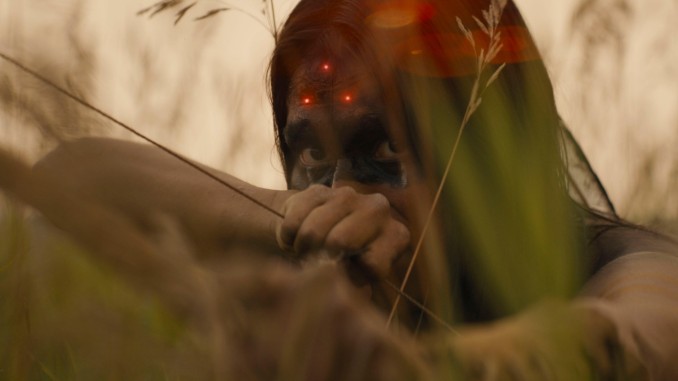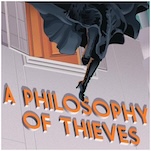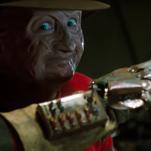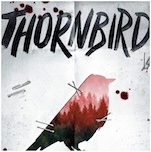The 20 Best Sci-Fi Movies on Hulu Right Now (October 2025)

The Hulu library tends to be something of a mixed bag for most film genres, science fiction included—films come and go fairly rapidly, making lists like this one that much more valuable. The sci-fi films now available run a gamut of different styles, from indie movies like Something in the Dirt or horror films that blend genres such as No One Will Save You or 2022 Predator prequel Prey, to sci-fi comedies like The Hitchhiker’s Guide to the Galaxy.
You may also want to consult the following, sci-fi centric lists:
The 100 best sci-fi movies of all time
The 100 best sci-fi TV shows of all time
The best sci-fi movies on Netflix
The best sci-fi movies on Amazon Prime
The best sci-fi movies on HBO Max
1. Alien
Year: 1979
Director: Ridley Scott
Stars: Sigourney Weaver, Tom Skerritt, John Hurt
Rating: R
Conduits, canals and cloaca—Ridley Scott’s ode to claustrophobia leaves little room to breathe, cramming its blue collar archetypes through spaces much too small to sustain any sort of sanity, and much too unforgiving to survive. That Alien can also make Space—capital “S”—in its vastness feel as suffocating as a coffin is a testament to Scott’s control as a director (arguably absent from much of his work to follow, including his insistence on ballooning the mythos of this first near-perfect film), as well as to the purity of horror as a cinematic genre. Alien, after all, is tension as narrative, violation as a matter of fact: When the crew of the mining spaceship Nostromo is prematurely awakened from cryogenic sleep to attend to a distress call from a seemingly lifeless planetoid, there is no doubt the small cadre of working class grunts and their posh Science Officer Ash (Ian Holm) will discover nothing but mounting, otherworldly doom. Things obviously, iconically, go wrong from there, and as the crew understands both what they’ve brought onto their ship and what their fellow crew members are made of—in one case, literally—a hero emerges from the catastrophe: Ellen Ripley (Sigourney Weaver), the Platonic ideal of the Final Girl who must battle a viscous, phallic grotesque (care of the master of the phallically grotesque, H.R. Giger) and a fellow crew member who’s basically a walking vessel for an upsetting amount of seminal fluid. As Ripley crawls through the ship’s steel organs, between dreams—the film begins with the crew wakening, and ends with a return to sleep—Alien evolves into a psychosexual nightmare, an indictment of the inherently masculine act of colonization and a symbolic treatise on the trauma of assault. In Space, no one can hear you scream—because no one is listening. —Dom Sinacola
2. The Fly
Year: 1986
Director: David Cronenberg
Stars: Jeff Goldblum, Geena Davis, John Getz
Rating: R
Between The Blob, The Thing, and The Fly, the ’80s were a magical decade for remaking already iconic ’50s horror/sci-fi movies. The original Kurt Neumann/Vincent Price version of The Fly is sometimes waved away as nothing more than a “camp classic,” but it’s a substantial film that is often more mystery than it is horror—a tightly focused narrative hinging around the question of why a woman has confessed to messily crushing her husband to death in a hydraulic press. Vincent Price is as entertaining as the fly-crossed scientist as you would no doubt expect him to be. The Cronenberg version, like the remake of The Blob, takes that basic premise and dresses it in both gallows humor and body horror, as Jeff Goldblum’s researcher literally watches pieces of his body gelatinize and melt away in front of him. As “Brundle” he’s great, full of manic sexual energy, ingenuity and eventually insectoid-enhanced physicality. Along with The Thing, the film is one of the last great hurrahs of the practical effects-driven horror era, featuring some of the more disgusting makeup and gore effects of all time. After seeing a man-sized Brundlefly vomiting acid, it’s difficult to ever look at a common housefly in the same way again. —Jim Vorel
3. Aliens
Year: 1986
Director: James Cameron
Stars: Sigourney Weaver, Bill Paxton, Jenette Goldstein, Paul Reiser, Lance Henriksen, Michael Biehn
Rating: R
James Cameron colonizes ideas: Every beautiful, breathtaking spectacle he assembles works as a pointillist representation of the genres he inhabits—sci-fi, horror, adventure, thriller—its many wonderful pieces and details of worldbuilding swarming, combining to grow exponentially, to inevitably overshadow the lack at its heart, the doubt that maybe all of this great movie-making is hiding a dearth of substance at the core of the stories Cameron tells. An early example of this pilgrim’s privilege is Cameron’s sequel to Ridley Scott’s horror masterpiece, in which Cameron mostly jettisons Scott’s figurative (and uncomfortably intimate) interrogation of masculine violence to transmute that urge into the bureaucracy that only served as a shadow of authoritarianism in the first film. Cameron blows out Scott’s world, but also neuters it, never quite connecting the lines from the aggression of the Weyland-Yutani Corporation to the maleness of the military industrial complex, but never condoning that maleness, or that complex, either. Ripley’s (Sigourney Weaver) story about what happened on the Nostromo in the first film is doubted because she’s a woman, sure, but mostly because the story spells disaster for the corporation’s nefarious plans. Private Vasquez’s (Jennette Goldstein) place in the Colonial Marine unit sent to LV-426 to investigate the wiping out of a human colony is taunted, but never outright doubted, her strength compared to her peers pretty obvious from the start. Instead, in transforming Ripley into a full-on action hero/mother figure—whose final boss battle involves protecting her ersatz daughter from the horror of another mother figure—Cameron isn’t messing with themes of violation or the role of women in an economic hierarchy, he’s placing women by default at the forefront of mankind’s future war. It’s magnificent blockbuster filmmaking, and one of the first films to redefine what a franchise can be within the confines of a new director’s voice and vision.—Dom Sinacola
4. Prey
Year: 2022
Director: Dan Trachtenberg
Starring: Amber Midthunder, Dakota Beavers, Dane DiLiegro, Stormee Kipp, Michelle Thrush, Julian Black Antelope
Rating: R
Filmmaker Dan Trachtenberg’s Predator prequel Prey succeeds by daring to embrace what prior sequels did not: Simplicity. The basics of Predator cinema boil down to skull trophies and rival combat, but most of all, the thrill of an uninterrupted hunt. With brutal ease, writer Patrick Aison translates Predator codes to hunter-gatherer dichotomies in Native American cultures. There’s nothing scarier than the laws of natural hierarchies on display in their most elemental forms, and that’s what Prey recognizes with menacing regard. Trachtenberg understands what Predator fans crave, and executes without mercy. Set in the Northern Great Plains of 1719, Prey pits a Predator challenging any species’ alphas—wolves, bears, people—against a Comanche tribe. Taabe (Dakota Beavers) leads other boys on hunts while his sister Naru (Amber Midthunder) practices her deadliest skills in secrecy. She’s dismissed by most for her gender, but not by Taabe. Naru’s chance to defeat a lion (thanks to Taabe) and earn her warrior’s rite of passage fails when a Predator’s alien technology distracts from afar—which no one believes. Only Naru can protect her family and tribespeople from the unknown Yautja threat since no one will listen, which will be the warrior-wannabe’s ultimate test. Prey is inarguably the best Predator since the original. The film gets so much right, paying homage to John McTiernan’s 1987 masterwork—through cigars and direct quotes that it’ll have fans hooting—and adding Indigenous representation with real cultural strength. Trachtenberg and Aison keep things simple, and that’s the special sauce. The performances are tough-as-nails, action sequences absurdly gory and intensity streamlined like a high velocity arrow. By going back to beginnings, Prey sheds pounds of franchise dead weight for a leaner, meaner Predator prequel with all the spine-tearing, one-liner-spouting gladiatorial conquest that fans desire—computer-generated or not. —Matt Donato
5. Predator
Year: 1987
Director: John McTiernan
Stars: Arnold Schwarzenegger, Carl Weathers, Jesse Ventura
Rating: R
A slasher film where battle-hardened soldiers replace the traditional nubile teens. Sounds like a recipe for a good time. And, indeed, Predator delivers on all fronts, from its cheesy approximation of “manly” dialogue (“I ain’t got time to bleed”) to the dated-yet-still-impressive special effects to the abundance of gory, creative violence. Subsequent installments in the sci-fi franchise have never truly captured the original’s meathead appeal. Besides, as any frequent viewer of VH1’s I Love the ‘80s can attest, the decade just wouldn’t have been the same without it.—Mark Rozeman
6. Biosphere
Year: 2023
Director: Mel Eslyn
Stars: Mark Duplass, Sterling K. Brown
Rating: NR
It makes a lot of sense that in Mel Eslyn’s feature debut Biosphere, the last two people left on Earth after the apocalypse are Billy (Mark Duplass), the most recent U.S. president, and Ray (Sterling K. Brown), the head honcho’s life-long best friend/trusted advisor. It would also make sense to want to avoid them; most rational, hierarchy-hating individuals would rather face the noxious toxins of a scorched planet that spend 106 minutes listening to the fears and desires of two dudes who almost certainly had a hand in the fall of civilization. Yet Billy and Ray immediately endear themselves to viewers, recounting Mario fan theories and decades-old drama that recruits even the most hardened of anti-American cynics into their bro-y camaraderie. This isn’t your usual capsule film about how two people cope with the encroaching end of humanity, though. Weirdly (and rather beautifully), it’s a story about the proliferation of life despite, say, some initial biological setbacks. When one of the men begins to notice staggering changes to his own body, questions of gender, sex and procreation eventually arise, making things a tad awkward for a lifelong best friendship predicated on cisgender heterosexuality. Once initial hesitations subside, however, the bond between the two transforms and strengthens into something wonderfully unexpected. With a script co-written by Eslyn and Duplass, Biosphere retains the distinct brand of organic conversational comedy that’s been present in the duo’s collaborative crossover for the past nearly 15 years. (Eslyn originally met Duplass and Lynne Shelton while working on their 2009 film Humpday, and is now the president of Duplass Brothers Productions.) While Biosphere and Humpday in particular both deal with the social construct of sexuality and the consequences (and potential joys) of eschewing these stark labels, Eslyn’s effort is able to heighten this investigation through a sci-fi lens and static setting, leaving society behind to engage in a narrative experiment that could only exist with such complete destruction of American social and political mores. To that point, the film feels on par with a successful stage play, especially as it pertains to the filmmaker’s utilization of a single location and ability to generate intense chemistry from the two actors involved. Biosphere’s interrogation of gender, sexuality and biology isn’t some cheap, thoughtless ploy to speak to any semblance of a “current moment,” but rather begs deeper questions about the precarious nature of human life. More aptly, Eslyn’s film asserts that humanity’s future survival – and potentially its only hope – relies on a shift in our collective thinking regarding who we are and how we can help each other.—Natalia Keogan
7. District 9
Year: 2009
Director: Neill Blomkamp
Stars: Sharlto Copley, Jason Cope, David James, Vanessa Haywood, Mandla Gaduka, Kenneth Nkosi, Eugene Khumbanyiwa, Louis Minnaar, William Allen Young
Rating: R
Let’s begin with a number: 30 million. That’s how much money Neill Blomkamp spent to make District 9, a movie small in scale but great in ambition, look like it cost four times that amount. Years later, Blomkamp’s career hasn’t realized the full promise shown in District 9, but here, he looks like a guy knows what he’s doing all the same. A genre stew blended from varying measurements of Alien Nation, Watermelon Man, Independence Day, The Fly and RoboCop, District 9 treads familiar territory in an unfamiliar place, through an unfamiliar lens, splicing documentary-style filmmaking together with stomach-churning body horror and, by the end, high-end action spectacle. At the time, the end results of Blomkamp’s mad sci-fi cocktail felt revelatory. Today they feel disappointing, a remark on what he could have been and where his career might have taken him if he’d not lost himself in the morass of Elysium or turned off even his more devoted followers with Chappie. All the same, District 9 remains a major work for a first-timer, or even a third-timer, polished and yet scrappy at the same time; the film tells of an artist with something to say, and saying it with electric urgency. —Andy Crump
8. Signs
Year: 2002
Director: M. Night Shyamalan
Stars: Mel Gibson, Joaquin Phoenix
Rating: PG-13
M. Night Shyamalan is one of Pennsylvania’s most loyal filmmakers, having shot every single one of his films at least partially in the state. And while not all of them feel particularly connected to place, 2002’s Signs exudes Pennsylvania-ness. The film opens on a lonely farm in Bucks County, PA (actually Doylestown, just north of Philadelphia), where former Episcopalian priest Graham Hess (Mel Gibson) lives with his children (Rory Culkin and Abigail Breslin), his baseball-star-turned-gas-station-attendant brother (Joaquin Phoenix), and the shadow of his deceased wife, whose death in an accident months earlier prompted Graham’s crisis of faith. Strange things begin occurring on the farm: complex crop circles, footsteps on the roof, aggression from the family dogs. Soon, the family is in the middle of a full-blown, global alien invasion. Bucks County is a place where everyone knows each other, and business owners speak disdainfully of “city people,” but this is not the kind of story where a small town bands together. It’s far from a warm community, and in fact it feels empty, judgmental and ever so slightly off in that uncanny Twilight Zone-esque way. And like The Twilight Zone before it, Signs finds its horror not in the aliens themselves (who, as many complained at the time of the films’ release, are pretty lame) but in the deep, unmooring sorrow that’s swallowing this family whole—an enemy not so easily defeated.–Maura McAndrew
9. Europa Report
Year: 2013
Director: Sebastian Cordero
Stars: Christian Camargo, Anamaria Marinca, Michael Nyqvist, Daniel Wu, Karolina Wydra, Sharlto Copley
Rating: PG-13
With echoes of 2001, director Sebastian Cordero’s innovatively structured thriller enthralls with not only its apparent scientific accuracy, but the passion it portrays among a class of people historically characterized by pocket protectors, taped eyewear and social awkwardness. Aboard the Europa One (Kubrick’s vessel was called the Discovery One), the six scientists bound for Europa, one of Jupiter’s moons (HAL and his crew were headed for the gas giant itself), are living, breathing human beings, with families and fears, ambition and emotions. They’re also just smarter than most of us and on a mission more significant than any of us will experience ever in our lives. The stakes are high in this mock doc/faux found-footage mystery, in which the privately funded space exploration company Europa Ventures issues a documentary on the fate of its first manned mission to investigate the possibility of alien life within our solar system. The sacrifices may be steep, but Europa Report is convinced—and wants to convince you—that a certain amount of horror is likely what it will take to explore such frontiers. —Annlee Ellingson
10. Prometheus
Year: 2012
Director: Ridley Scott
Stars: Noomi Rapace, Michael Fassbender, Guy Pearce, Idris Elbra, Logan Marshall-Green, Charlize Theron
Rating: R
For decades, Ridley Scott resisted the pop-cultural desire to see him return to the nightmare world he originally created in 1979’s Alien. This only built anticipation to see that very thing happen over the years, to the point that 2012’s Prometheus became one of the year’s most hotly anticipated experiences. And Scott delivered … a film that explored the issues he found most intriguing within the world of Alien, subverting the audience’s expectations and earning their ire in the process. Prometheus is a beautiful, immaculately designed film, brimming with intriguing philosophical quandaries on the nature of mankind’s existence, destiny and power to build and destroy. Unfortunately, it’s also a rather clumsy creature feature at the same time, rightly derided at the time of release for empty-headed characters making some of the dumbest decisions in the history of the genre. It’s difficult to reconcile these parts of Prometheus together, but with the clarity of time, it’s easier than ever to praise Scott’s boldness in delivering something other than just another xenomorph story. Prometheus has plenty of flaws, but a lack of ambition was never one of them. —Jim Vorel
11. Something in the Dirt
Year: 2022
Directors: Justin Benson, Aaron Moorhead
Stars: Justin Benson, Aaron Moorhead
Rating: R
Poke around online for any amount of time and you’ll inevitably stumble upon a strange corner promoting one oddity or another. Even if you promise only to follow friends on social media, to read trusted sources, to avoid all but the most wholesome memes, strangeness—and those pushing it to make a buck—will find you. That might take the form of an algorithm recommending some flat-Earther nonsense after you looked up a flatbread recipe, or of a random LinkedIn message from a half-remembered co-worker who’s fallen into something that doesn’t call itself a cult but avoids doing so almost conspicuously. And that’s not even touching QAnon, COVID deniers or the History Channel. Capitalized conspiracy surrounds us. Half mock-doc, half sci-fi two-hander, all bone-dry L.A. satire, Something in the Dirt takes a bemused look at those all too happy to exploit phenomena and each other—with the typical small-scale charm of an Aaron Moorhead and Justin Benson project. Delving into their own DIY careers, filmmakers Moorhead and Benson respectively play John, a religious wedding photographer, and Levi, his new bartender bum neighbor, who decide to make a documentary together after seeing a freaky bit of unexplainable floating and shining in the latter’s apartment. Enamored by the levitation and refracting aura of an irregular glassy prism (alongside a swollen closet door that won’t shut into its equation-covered jambs), the pair of oddballs dig into all the strange explanations for what might be going on. Is it geography? Geology? Ghosts? Whatever the case, they naturally also discuss how much a quick-and-dirty doc about their investigation might net them after a sale to Netflix. It’s L.A., after all. The pair of indie all-stars have made some of the best genre films of the last few years (seriously, go watch The Endless right now), so it makes sense for them to integrate self-reflection into this uncomfortable semi-spoof. When you make a movie—especially when you make them like Benson and Moorhead—you live in your own little world. Something in the Dirt’s silly, strange and unnerving depiction of this process judges the sanity of those willing to do so while explaining why, for some people, it’s the only thing that makes sense.—Jacob Oller
12. Crimes of the Future
Year: 2022
Director: David Cronenberg
Stars: Viggo Mortensen, Léa Seydoux, Kristen Stewart, Don McKellar, Scott Speedman
Rating: R
Sharing a title with Cronenberg’s second film, the latest from the body horror auteur is a return to (de)form after two decades of more dialed-back drama. Digging into the art world’s juicy guts and suturing it up as a compelling, ambitious sci-fi noir, Crimes of the Future thrills, even if it leaves a few stray narrative implements sewn into its scarred cavities. The dreamy and experimental Crimes of the Future (1970) sees creative cancers develop in a womanless world ravaged by viruses. New organs are created (and sometimes worshiped) in a broken society now run by fetishists and hurtling towards a dire, damnable biological response. While Cronenberg’s 2022 do-over on the subject of organic novelty in a collapsing society isn’t a remake by any stretch of the new flesh, it addresses the same pet interests that’ve filled his films since the beginning. Thankfully, it does so with new subtextual success and a far more straightforward and accessible text (despite the full-frontal nudity and graphic autopsies). Unlike Cronenberg’s early work, this movie has color, diegetic sound and movie stars. It embraces traditional dramatic pacing and supplements its perversion with cutting-edge effects. And at least now the characters speak to each other—in that detached, psychology-textbook-meets-FM-2030-essay style—while the camera dives deep into the guts that fascinate us. Specifically, the guts of Saul Tenser (Viggo Mortensen). He and Caprice (Lea Seydoux) are performance artists whose medium is the generation and removal of neo-organs. Saul builds them up, Caprice slices them out. Our destruction of the world, filling its oceans with plastic and its air with pollution, allowed this to happen. Humanity is now literally numb. People slice each other with knives at clubs, or in the street. Recreational surgery is commonplace. Many can only feel real pain while asleep. This unconscious suffering is just one of many sharpened sides of Crimes’ metaphor. Art is evolving to meet this nerve-deadened world on its terms. Humans are too, literally. That’s why Saul’s able to squeeze out nasty new lumps of viscera and why National Organ Registry investigators Wippet (Don McKellar) and Timlin (Kristen Stewart), as well as radical transhumanist Lang (Scott Speedman), find him fascinating. The trio help narratively blend the dystopian bureaucracy and thriving, subversive multimedia generated by Cronenberg’s nihilistic predictions. When we eventually ruin things, there will just as surely be new cogs in old machines as there will be new rebels in old resistances. Erudite and exploitative, gory yet gentle, Crimes of the Future shows the new kids on the chopping block that an old master can still dissect with the best. But Crimes of the Future’s more meaningful impact is in its representation of a trailblazer finally seeing the horizon. Cronenberg’s view of the future understands that the true death of an artist and the death of society at large result from the same tragic failure to evolve—even if that innovation is simply renovation.—Jacob Oller
13. Predator: Killer of Killers
Year: 2025
Director: Dan Trachtenberg
Stars: Lindsay LaVanchy, Louis Ozawa Changchien, Rick Gonzalez, Michael Biehn
Rating: R
Slick, fast-paced and never skimping on the bloody spectacle, Dan Trachtenberg’s so-called “secret entry” into the Predator mythos before 2025’s theatrically released Predator: Badlands is this animated Hulu quasi-anthology, which sees fit to finally deliver on the implication established by the 1987 original film: That the extraterrestrial race of big-game hunters known as predators have hunted human beings for sport all through our history, selecting our deadliest warriors to test themselves against. Such a premise has been catnip to Predator fans for a long time, and it’s fun to finally see it realized in a format that at first appears to be a conventional anthology, before it becomes clear that despite the time-hopping, all of Killers of Killers‘ stories will be looping in on each other. The action is unsparing in its brutality, although the animation can’t quite always hold up its end of the bargain, at times lacking enough smoothness to avoid feeling choppy. Still, Killer of Killers allows us to live out some of the theoretical scenarios we’ve always wanted to see, like “Viking vs. predator” or “ninja vs. predator.” This is some fine fan service. —Jim Vorel
14. The Hitchhiker’s Guide to the Galaxy
Year: 2005
Director: Garth Jennings
Stars: Martin Freeman, Zooey Deschanel, Sam Rockwell, Mos Def, Alan Rickman, Bill Nighy
Rating: PG
Prior to 2005, The Hitchhiker’s Guide to the Galaxy was the sort of cult, absurdist novel that one might have been tempted to label as unfilmable, not only for its strange characters and story but primarily for the ephemeral difficulty of translating Douglas Adams’ absolutely unique sense of humor to the screen. Director Garth Jennings, however, gave Hitchhiker’s Guide a very fond and colorful shot, which, although not completely successful, may well have been the best that anybody could have done under the circumstances. The screenplay thankfully had contributions from Adams himself prior to his death in 2001, and there are entire sequences that faithfully interpret iconic sequences from the novel, such as the transformation of a pair of missiles into … a bowl of petunias, and a very confused sperm whale. Suffice to say, the result is still rather opaque to many viewers, but the strong casting of Martin Freeman and Sam Rockwell in particular (along with the sad-sack voice of Alan Rickman) ultimately make for a passable interpretation of one of the most beloved comedy novels ever. —Jim Vorel
15. Alita: Battle Angel
Year: 2019
Director: Robert Rodriguez
Stars: Rosa Salazar, Christoph Waltz, Jennifer Connelly, Mahershala Ali, Ed Skrein, Jackie Earle Haley, Keean Johnson
Rating: PG-13
Alita: Battle Angel begins with Dyson Ito (Christoph Waltz), doctor to cyborgs, scavenging through a junkyard full of spare parts in order to find anything he can use. What better way to start a film than with a metaphor about itself? Just like Dr. Ito, director Robert Rodriguez and co-writer/co-producer James Cameron sift through the remnants of established sci-fi and cyberpunk properties in order to glue together a recognizable and cohesive narrative within the confines of its genre. Considering the talent involved, it’s not surprising that the finished product is a frequently fun and kinetic, visually pleasing sci-fi/actioner, albeit one that doesn’t have a single new or fresh part embedded in it. Based on the popular manga, Gunnm, Alita: Battle Angel mostly takes its visual cues and narrative structure from a 1993 anime adaptation by the same name. That anime is barely an hour long, yet manages to pack in a sprawling cyberpunk universe with a deep and complex lore that supports whatever over-the-top tech fetish cyber action it throws at you. The story follows Alita (Rosa Salazar), whom Dr. Ito finds during his junk hunt and brings back to life. Her brain is human, but the rest of her is artificial. Just like a cyborg version of Jason Bourne, she doesn’t remember her past, but has supreme ass-kicking instincts, leading Ito to suspect some sinister military use in her past. The future world that Battle Angel inhabits is the lovechild of Blade Runner and Mad Max, a grimy post-apocalyptic city that’s also a grand, overpopulated cyberpunk metropolis. When the fighting finally begins, Battle Angel gets its metallic ass in gear. Rodriguez pushes the confines of the PG-13 rating to create some genre- and source-material-appropriate hack-and-slash gruesomeness with a significant amount of cyborg bodies split in half, decapitated and torn to pieces. For fans of futuristic sci-fi/action, it should provide an engaging if somewhat forgettable experience. —Oktay Ege Kozak
16. Aporia
Year: 2023
Director: Jared Moshe
Stars: Judy Greer, Edi Gathegi, Payman Maadi, Adam O’Byrne
Rating: R
Build a relationship, a home, a family, a life with the person you love over the years, and you will still occasionally give them The Look, the one that says, “who are you, and how well do I know you?” It’s the look Sophie (Judy Greer) gives her husband, Mal (Edi Gathegi), partway through Jared Moshe’s Aporia, when through the miracle of technology she puts the wrong things right and effectively brings him back from the grave. Mal starts out the film in the ground, seen only in flashbacks to better days before getting struck by Darby (Adam O’Byrne), a drunk driver, and dying. Then comes Jabir (Payman Maadi), a family friend and erstwhile physicist from an unidentified country who makes a living in America driving indifferent fares around town. Jabir has a remedy for Sophie’s grief, but it’s a doozy both existentially and ethically, in the tradition of so much science fiction cinema. Jabir has built a device one could generously call a “time machine” the way one could call a hellfire missile “demolition equipment.” It can’t send Sophie back in time, but it can send a burst of quantum-mechanical energy straight into Darby’s brain and kill him, before the day he kills Mal, which means Mal never dies and Sophie’s life doesn’t fall apart. Presented with her personal version of the ultimate time travel question – would you kill baby Hitler? – Sophie dithers, then pulls the trigger. The good news is, Mal is back, and everything’s back to normal. The bad news is, Darby has a family, Sophie has a conscience, and one morally suspect decision leads to a whole bunch of better-intended ones with their own imperfect outcomes. Greer, in one of her too-infrequent starring roles, plays to Sophie’s anxieties as well as her wants all at once, a tight-wound ball of nerves. Every time she disperses her tension, every time she talks with Mal and Jabir about disaster scenarios, the tension whips right back around like a boomerang, and she starts her emotional cycle all over again. It’s a performance that suits Greer’s reputation for playing unhinged types, reminding viewers that her reputation as a comic actor is built on a well-rounded skill set. Moshe is a gentle filmmaker, evinced by his realist aesthetic, unadorned by special effects, and his intrinsic compassion for Sophie’s dilemma. He cares. But he is necessarily stern, because for a movie like Aporia to work, a director has to mean what they’re saying, and he holds little back. Our actions matter, big or small, and now’s a good time for the sci-fi genre to give us a needed reminder.—Andy Crump
17. Humane
Year: 2024
Director: Caitlin Cronenberg
Stars: Jay Baruchel, Emily Hampshire, Sebastian Chacon, Alanna Bale, Sirena Gulamgaus, Uni Park, Enrico Colantoni, Peter Gallagher
Rating: R
Humane, the new dystopian horror film from writer Michael Sparaga and director Caitlin Cronenberg (yes, as in David and Brandon Cronenberg), certainly starts with the potential for greatness, and the good news is that it never lets go of the sense that we’re in capable, steady hands. Sadly, that sense of steadiness and basic filmmaking competence never takes Humane beyond its hook, leaving us with a social thriller that, despite flashes of brutal brilliance, never feels like it’s reaching for anything more. In the world of Humane, an unnamed ecological catastrophe has crippled the Earth, leaving water supplies dwindling and ultraviolet rays from the sun coming through with such force that everyone carries special umbrellas for protection. Resources are dwindling, which means the governments of the world have made a drastic choice: Reduce their populations by 20% to allow Earth to heal, and save human civilization in the long run. —Matthew Jackson
18. The Pod Generation
Year: 2023
Director: Sophie Barthes
Stars: Emilia Clarke, Chiwetel Ejiofor
Rating: PG-13
The Pod Generation has too much on its mind, introducing one idea after another as worldbuilding details to buttress its main concerns about women’s bodily autonomy. As fumbles go, Barthes straining her story’s seams isn’t a game-ender; when making art that imagines the future by mulling over the present, it’s worse by far not to think enough. It’s not the filmmaker’s fault that a tech doofus has rebranded Twitter as “X” or that the NFT market sank and took every Bored Ape variant with it. But these very stupid developments nonetheless date The Pod Generation on its arrival in theaters. These developments don’t detract much from the film, because Barthes is a good filmmaker and the space she’s working in retains just the right amount of elasticity between surprise and predictability. It’s obvious, for one thing, that the protagonists, Rachel (Clarke) and her husband Alvy (Chiwetel Ejiofor), will swap perspectives about halfway through The Pod Generation, allowing Barthes’ script to stretch out to fully consider its themes. —Andy Crump
19. Donnie Darko
Year: 2001
Director: Richard Kelly
Stars: Jake Gyllenhaal, Jena Malone, Maggie Gyllenhaal, James Duval, Drew Barrymore, Mary McDonnell, Katharine Ross, Patrick Swayze
Rating: R
Apparently, at some point in its burgeoning cult ascendency, director Richard Kelly admitted that even he didn’t totally get what’s going on in Donnie Darko—going so far as to release a “Director’s Cut” in 2005 that supposedly cleared up some of the film’s more unwieldy stuff. Yet another example of a small budget wringed of its every dime, Kelly’s debut crams love, weird science, jet engines, superhero mythology, wormholes, armchair philosophy, giant bunny rabbits and Patrick Swayze (as a child molester, no less) into a film that should be celebrated for its audacity more than its coherency. It also helps that Jake Gyllenhaal leads a stellar cast, all totally game. In Donnie Darko, the only thing that’s clear is Kelly’s attitude: that at its core cinema is the art of manifesting the unbelievable, of doing what one wants to do when one wants to do it. —Christian Becker
20. No One Will Save You
Year: 2023
Director: Brian Duffield
Stars: Kaitlyn Dever
Rating: PG-13
Kaitlyn Dever heroically carries what’s essentially a one-woman show as townie Brynn Adams, a lonesome soul fighting off bug-eyed gray trespassers. That’s…pretty much it. She’s seen scribbling letters to a presumed deceased Maude Collins before the flying saucers appear, but then sci-fi terror begins and Duffield channels everything from Signs to The McPherson Tape. Brynn dashes around her creaky wooden childhood home, Brynn hides from alien entities, and Brynn flees from an unknown fate should the cosmic outsiders catch her in their spaceship tractor beams. The craftsmanship behind No One Will Save You showcases Duffield’s strengths with restricted resources. Visual effects studio DNEG nails the creation of traditional X-Files-lookalike aliens down to their bulbous craniums and slender-freaky figures, but that’s only one component. Duffield does a splendid job collaborating with cinematographer Aaron Morton to frame his interstellar guests as stalkers, often peering just out of frame before swelling in size and entering with emphasis. No One Will Save You adheres to a golden creature feature rule by showing Brynn’s adversaries early and never shying away from full-screen reveals, which wafts an appropriate air of confidence. As Brynn cowers behind refrigerator doors or turns her hatchback into an impromptu firebomb, the aliens always hold their impressive on-screen presence. —Matt Donato







































